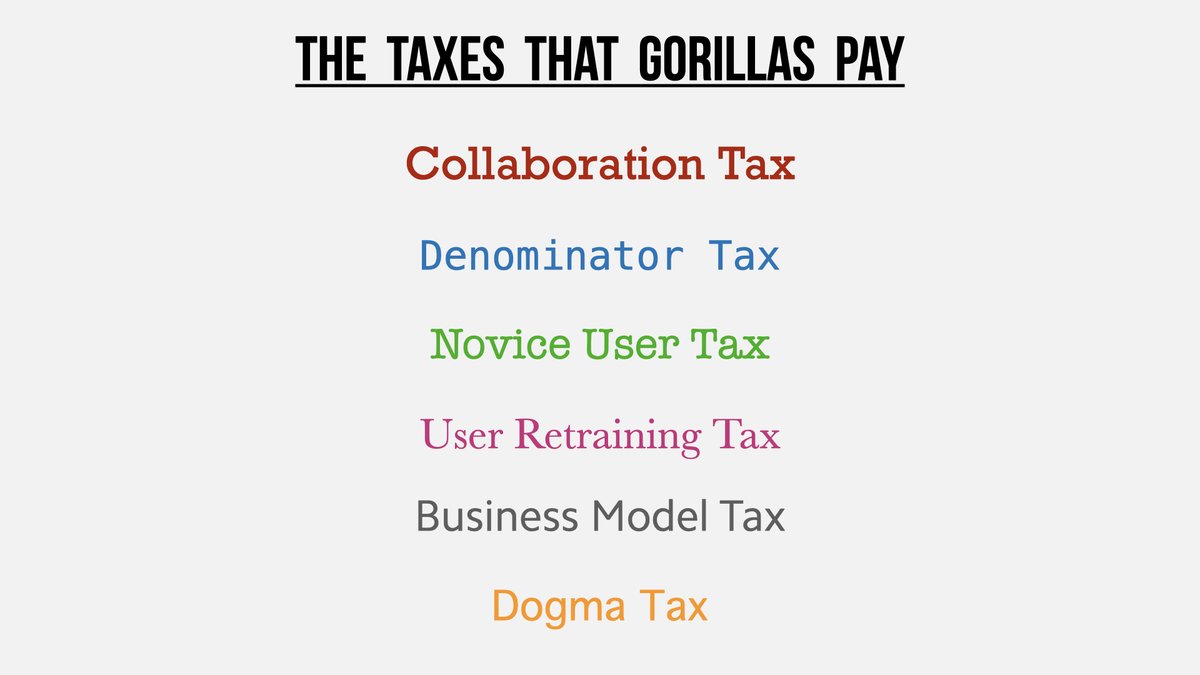Collaboration Tax
Getting two or more product groups at a megacorp to collaborate on creating a seamless end user experience is the hardest problem in computer science.
(I am not joking)

If you\u2019re a Startup trying to compete with a Megacorp\u2014the 800-pound Gorilla in the space\u2014you need to understand the tax inherent to being a Gorilla
— Shreyas Doshi (@shreyas) November 26, 2020
And then you need to make that tax work against the Gorilla\u2014with your product's positioning & features
A thread on Gorilla taxes\U0001f447\U0001f3fe pic.twitter.com/rk7H4zmIpV
A thread of my most popular threads:
— Shreyas Doshi (@shreyas) September 8, 2020
Product Strategy\u2014in 1 tweet.
— Shreyas Doshi (@shreyas) May 17, 2020
What:
Rigorous treatment of where to play & how to win
Why:
Drastically improve odds of product success
Create org-wide clarity
Outlook:
3-5 years
Components:
Situation assessment
Target customers
Differentiation pillars
Roadmap
Brief action plan
There comes a point in a company\u2019s life when it becomes its own largest customer.
— Shreyas Doshi (@shreyas) November 29, 2020
This is the crossover point in the \U0001d465-pattern below.
Left side of \U0001d465 is largely about Produce work. Right side largely Organize+Self-promote work.
Crossover is inevitable, but defer it if you can pic.twitter.com/xapPXvNDqO
Breaking into PMing - a \U0001f9f5 // A question folks from eng/design/other functions often have how to become a PM in a tech co.
— Sriram Krishnan (@sriramk) April 14, 2020
It can seem non-obvious and differs with each company but here are some patterns I've seen work. All the below assumes you have no PMing on your resume.
There is no One Correct Way\u2122 to learn
— Shreyas Doshi (@shreyas) August 15, 2020
Don\u2019t feel pressured to read 70 books/year just becos Super-Successful Person X does that
Videos, Podcasts, Audiobooks, Discussions\u2014all are fine
What to do:
Understand your preferred learning style
Don't resist it, embrace it
Commit to it
A B2B Product Management Story: on discovering problems that customers actually care about
— Shreyas Doshi (@shreyas) March 28, 2021
Very visual story thread\U0001f447\U0001f3fe pic.twitter.com/SQKpmLtBGC
3 types of product leaders:
— Shreyas Doshi (@shreyas) March 26, 2021
1) The Operator
2) The Craftsperson
3) The Visionary
It is important for you as a startup founder or CEO, product manager, or a product leader to deeply understand these types, as you make decisions on whom to hire or whom to work for.
Thread\U0001f447\U0001f3fe
There are 3 levels to product work
— Shreyas Doshi (@shreyas) March 12, 2021
(1) The Execution level
(2) The Impact level
(3) The Optics level
When an individual & their team are fixated on different levels, often there is conflict.
E.g.
PM is fixated on (2), Team on (1)
PM on (3), Team on (2)
PM on (2), Team on (3)
How I like to plan my work:
— Shreyas Doshi (@shreyas) March 17, 2021
Limit meetings
\u21d2 Long scheduled work blocks
At end of the work day, plan next day
\u21d2 Easier to disconnect, be present
Fit the next day's tasks in calendar
\u21d2 Forces prioritizing
Plan next week on Friday evening
\u21d2 Go into weekend with a clear mind


